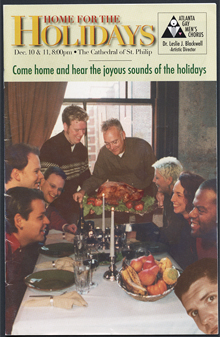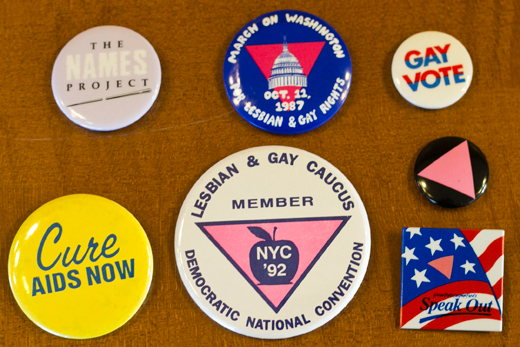Emory University's Manuscript, Archives, and Rare Book Library (MARBL) has launched a concerted effort to expand its collection of historically significant lesbian, gay, bisexual, and transgender (LGBT) materials, particularly as they relate to Atlanta, its history and its response to the AIDS crisis.
"Our focus is on collecting materials that document LGBT history, culture, politics, and community well-being and public health," says Randy Gue, curator of MARBL's Modern Political and Historical Collections.
Two events are planned in conjunction with the growing collection. On Thursday, June 20, "GALA Celebrates the Emory LGBT Archives" will take place at 6:30 pm in the Jones Room and Schatten Gallery on level 3 of the Robert W. Woodruff Library. The public is welcome to join Emory LGBT alumni for a presentation by Gue to learn more about the collection, followed by refreshments and a tour of the SCLC exhibition in the gallery.
Tickets are $10 for Emory alumni, faculty, students and staff and $15 for non-Emory affiliated attendees and can be purchased online or at the door.
In August, an exhibit of materials from the LGBT collections is planned in MARBL on level 10 of the Woodruff Library; additional details will be posted on web.library.emory.edu as they become available.
LGBT collection rich, varied
MARBL has collected the materials and papers of gay figures for years, which are scattered throughout the collections. It holds the papers of poet W.H. Auden, writer James Baldwin and poet Carol Ann Duffy, as well as the records of organizations such as the National Association of Black and White Men Together (NABWMT) and the Atlanta-based Southeastern Arts, Media, and Education Project (SAME), among others.
Last year, MARBL began a focused effort to build an LGBT collection. Through an initial contact at Emory's Rollins School of Public Health, MARBL acquired in August 2012 the papers of Jesse Peel, a retired Atlanta psychiatrist and longtime AIDS activist who was involved in local activist groups and fundraising efforts.
Since then, MARBL has acquired additional collections, such as the papers of Rebecca Ranson, an Atlanta-based playwright and activist, who donated her materials to MARBL in March. She wrote one of the first plays about AIDS, and served as executive director of SAME, a group founded to provide an outlet for artistic expression and education during the crisis.

Atlanta, civil rights, social justice emphasized
The LGBT materials complement two of MARBL's collecting strengths: its holdings related to Atlanta and those related to civil rights and social justice movements.
"The LGBT community has played a very important part in the history of Atlanta, and when you talk about the 1970s and 1980s here, that's when the LGBT population really started to grow in terms of public visibility and influence," Gue says. "I want to extend the chronology of our collections about Atlanta, especially in this under-documented but very important community."
For Atlanta and Emory to be the home base for the story of the response to the AIDS crisis seems a natural fit, says Gue. With the Centers for Disease Control (CDC) headquartered in Atlanta, general awareness was heightened locally. Gue adds that Atlanta's grassroots response to the HIV/AIDS crisis inspired several activist groups to form and give support to patients, their families and friends.
"One of the key aspects of LGBT community public health and politics is the HIV/AIDS crisis," says Gue. "We are especially interested in collecting materials that document Atlanta's response to the AIDS crisis in the 1980s and 1990s. It's so important to preserve that aspect of Atlanta's history."
MARBL's LGBT collections also include:
Atlanta Gay Men's Chorus (AGMC) archive, containing a broad range of materials that document its history, including programs from performances, promotional material, newsletters, membership directories, photographs and recordings of AGMC performances. "The Atlanta Gay Men's Chorus is an Atlanta treasure, and we are thrilled they have entrusted MARBL with their history," Gue says.
The gay paperback collection, part of MARBL's effort to preserve LGBT print culture, includes 924 titles, 78 percent of which are owned by five or fewer libraries in the world (and 167 titles not owned by any other library). Most of the books in the collection were published in the 1960s and 1970s. "These were cheap paperbacks published on the margins of the publishing world, but they're in amazing shape," Gue says. "It's really remarkable to find this many books in such good condition."
"American Music Show" video recordings from 1982-2005. This campy Atlanta public access television program was one of the longest-running public access shows in America. RuPaul made his television debut on the show. The collection consists of more than 700 videotapes of the show as well as artwork, newspapers clippings and other materials.
Two scrapbooks from Willis Bivins, founder of the Atlanta chapter of the National Association of Black and White Men Together (NABWMT). MARBL holds the records of both the national association and the Atlanta chapter. Bivins' scrapbooks contain snapshots of the first Gay Pride March in New York in 1970 as well as two rare early periodicals, "Gay Liberation" and "The Gay Manifesto."
Alex Wan, director of development for the Emory Libraries, says efforts are underway to raise funds to organize and describe the collections. "We need to raise money to process these papers so we can provide the broadest possible access to these unique materials," he says.
Both he and Gue envision expanding the collection to include influential LGBT members in politics, business and other aspects of the Atlanta community.
"The Atlanta LGBT community has such a rich history," adds Wan, who also sits on Atlanta City Council. "There are a number of firsts in terms of LGBT elected officials in Atlanta and in Georgia that are part of the story, and we'd love to add their papers to our collections."
To make a donation to support the growth and processing of LGBT collections, click here.
Media contacts: Holly Crenshaw (holly.crenshaw@emory.edu, 404.727.0211), or Elaine Justice (elaine.justice@emory.edu, 404.727.0643).

